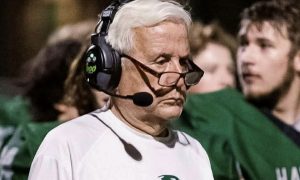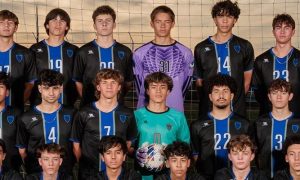[tps_header]Jim “Guts” Rappis[/tps_header]
[tps_title]NO. 10[/tps_title]

Jim Rappis is the biggest badass to wear the Arizona uniform when it comes to playing through multiple serious injuries
How can a player nicknamed “Guts” be left off a Top 10 badass list?
Jim Rappis, a point guard who could also shoot, matched his toughness with his smarts as a two-time All-Academic selection in the WAC. He was a model of perseverance in his Arizona career because of numerous injuries that would sideline other athletes for long periods of time.
The list reads like a night at the ER:
— Rappis fractured an ankle as a freshman and still managed to play nine games afterward.
— He suffered a ruptured appendix at the beginning of his sophomore year and had a series of ankle injuries but still played in 24 of 26 games.
— Another ankle injury when he was a junior forced him to use a cane off the court throughout the season.
— He underwent surgery to correct a spinal disc before the 1975-76 season and was in grave danger of losing his life when he contracted peritonitis (inflammation of a thin layer of tissue inside the abdomen, caused by bacteria or fungus).
— In the 1976 West Regional Semifinal — one of the most thrilling games in Arizona history when the Wildcats beat Jerry Tarkanian and UNLV 114-109 in overtime — Rappis injured his left heel with 5:57 left in the first half but continued to play despite being hobbled throughout. He finished with 24 points and 12 assists against the Running Rebels. His 12 assists were more than what UNLV produced as a team.
“Jimmy is the epitome of courage,” Arizona coach Fred Snowden was quoted as saying by the Tucson Citizen afterward.
His heel injury limited him to only four points against UCLA in the West Regional Final, lost by the Wildcats 82-66 at Pauley Pavilion. Rappis was still selected to the NCAA West Regional all-tournament team.
His teammates called him “Guts” and Snowden labeled him “The Six Million Dollar Man”.
“He would arrive to games on crutches,” Snowden told me in a 1990 interview with the now defunct Cat Tracks magazine, “but he would go out and play like there was absolutely nothing wrong with him.
“He joined us late in December (following back surgery) without the benefit of fall practice, and he walks out there and was one of our leading scorers. He was a courageous, incredible athlete.”
Rappis gained some of his toughness by playing football. He was also an accomplished quarterback at Waukesha (Wis.) High School before Snowden lured him to Tucson after his hire as Arizona’s coach in 1972.
Rappis, 57, is retired and lists residences in Tucson and his hometown of Waukesha.























